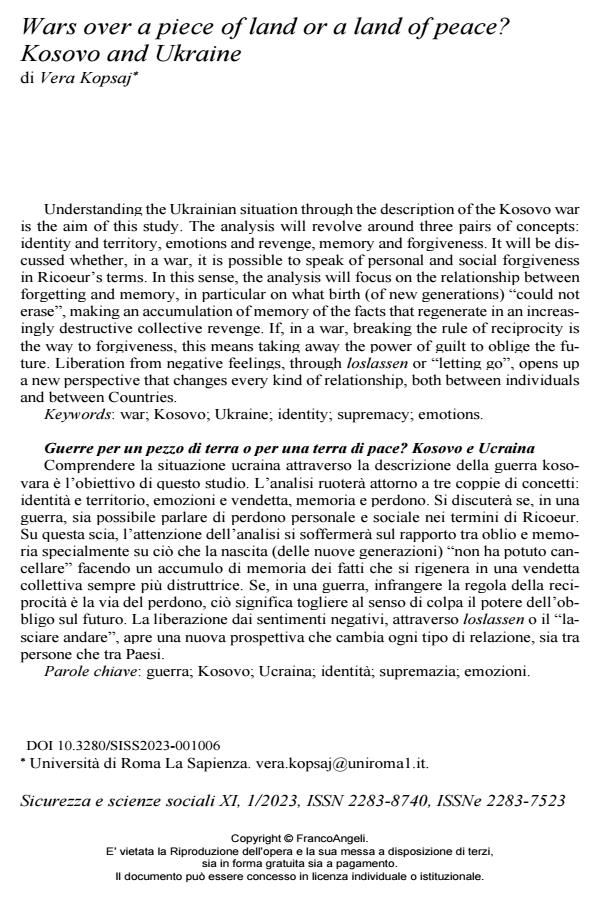Wars over a piece of land or a land of peace? Kosovo and Ukraine
Titolo Rivista SICUREZZA E SCIENZE SOCIALI
Autori/Curatori Vera Kopsaj
Anno di pubblicazione 2023 Fascicolo 2023/1
Lingua Inglese Numero pagine 15 P. 54-68 Dimensione file 211 KB
DOI 10.3280/SISS2023-001006
Il DOI è il codice a barre della proprietà intellettuale: per saperne di più
clicca qui
Qui sotto puoi vedere in anteprima la prima pagina di questo articolo.
Se questo articolo ti interessa, lo puoi acquistare (e scaricare in formato pdf) seguendo le facili indicazioni per acquistare il download credit. Acquista Download Credits per scaricare questo Articolo in formato PDF

FrancoAngeli è membro della Publishers International Linking Association, Inc (PILA), associazione indipendente e non profit per facilitare (attraverso i servizi tecnologici implementati da CrossRef.org) l’accesso degli studiosi ai contenuti digitali nelle pubblicazioni professionali e scientifiche.
Understanding the Ukrainian situation through the description of the Kosovo war is the aim of this study. The analysis will revolve around three pairs of con-cepts: identity and territory, emotions and revenge, memory and forgiveness. It will be discussed whether, in a war, it is possible to speak of personal and social forgiveness in Ricoeur’s terms. In this sense, the analysis will focus on the relation-ship between forgetting and memory, in particular on what birth (of new genera-tions) "could not erase", making an accumulation of memory of the facts that re-generate in an increasingly destructive collective revenge. If, in a war, breaking the rule of reciprocity is the way to forgiveness, this means taking away the power of guilt to oblige the future. Liberation from negative feelings, through loslassen or "letting go", opens up a new perspective that changes every kind of relationship, both between individuals and between Countries.
Comprendere la situazione ucraina attraverso la descrizione della guerra kosovara è l’obiettivo di questo studio. L’analisi ruoterà attorno a tre coppie di concetti: identità e territorio, emozioni e vendetta, memoria e perdono. Si discuterà se, in una guerra, sia possibile parlare di perdono personale e sociale nei termini di Ri-coeur. Su questa scia, l’attenzione dell’analisi si soffermerà sul rapporto tra oblio e memoria specialmente su ciò che la nascita (delle nuove generazioni) "non ha potuto cancellare" facendo un accumulo di memoria dei fatti che si rigenera in una vendetta collettiva sempre più distruttrice. Se, in una guerra, infrangere la regola della reciprocità è la via del perdono, ciò significa togliere al senso di colpa il potere dell’obbligo sul futuro. La liberazione dai sentimenti negativi, attraverso loslassen o il "lasciare andare", apre una nuova prospettiva che cambia ogni tipo di relazio-ne, sia tra persone che tra Paesi.
Parole chiave:guerra; Kosovo; Ucraina; identità; supremazia; emozioni.
Vera Kopsaj, Wars over a piece of land or a land of peace? Kosovo and Ukraine in "SICUREZZA E SCIENZE SOCIALI" 1/2023, pp 54-68, DOI: 10.3280/SISS2023-001006